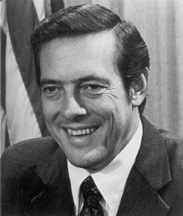Bill Brock
| Bill Brock | |
|---|---|
 |
|
| 18th United States Secretary of Labor | |
|
In office April 29, 1985 – October 31, 1987 |
|
| President | Ronald Reagan |
| Preceded by | Raym Donovan |
| Succeeded by | Ann McLaughlin |
| 8th United States Trade Representative | |
|
In office January 23, 1981 – April 29, 1985 |
|
| President | Ronald Reagan |
| Preceded by | Reubin Askew |
| Succeeded by | Clay Yeutter |
| Chair of the Republican National Committee | |
|
In office January 14, 1977 – January 20, 1981 |
|
| Preceded by | Mary Louise Smith |
| Succeeded by | Dick Richards |
|
United States Senator from Tennessee |
|
|
In office January 3, 1971 – January 3, 1977 |
|
| Preceded by | Al Gore |
| Succeeded by | Jim Sasser |
| Member of the U.S. House of Representatives from Tennessee's 3rd district |
|
|
In office January 3, 1963 – January 3, 1971 |
|
| Preceded by | James Frazier |
| Succeeded by | LaMar Baker |
| Personal details | |
| Born |
William Emerson Brock III November 23, 1930 Chattanooga, Tennessee, U.S. |
| Political party | Republican |
| Education | Washington and Lee University (BA) |
| Military service | |
| Allegiance |
|
| Service/branch |
|
| Years of service | 1953–1956 |
William Emerson "Bill" Brock III (born November 23, 1930) is a former Republican United States senator from Tennessee, having served from 1971 to 1977. He is the grandson of William Emerson Brock I, who was a Democratic U.S. senator from Tennessee from 1929 to 1931.
Brock was a native of Chattanooga, where his family owned a well-known candy company. He is a 1949 graduate of McCallie School and a 1953 graduate of Washington and Lee University in Lexington, Virginia, in 1953 and subsequently served in the U.S. Navy until 1956. He then worked in his family's candy business. Brock had been reared as a Democrat, but became a Republican in the 1950s. In 1962, he was elected to Congress from Tennessee's 3rd congressional district, based in Chattanooga. The 3rd had long been the only Democratic outpost in traditionally heavily Republican East Tennessee; indeed, Brock's victory ended 40 years of Democratic control in the district.
Brock served four terms in the House and then won the Republican nomination to face three-term incumbent U.S. Sen. Albert Gore Sr. in 1970, defeating country singer Tex Ritter in the primary. Brock's campaign was successfully able to make an issue of Gore's friendship with the Kennedy family and Gore's voting record, which was somewhat liberal by Southern standards, and defeated him.
...
Wikipedia
